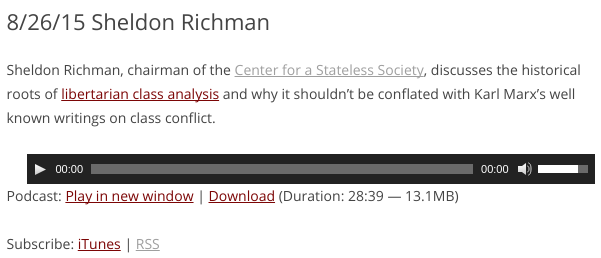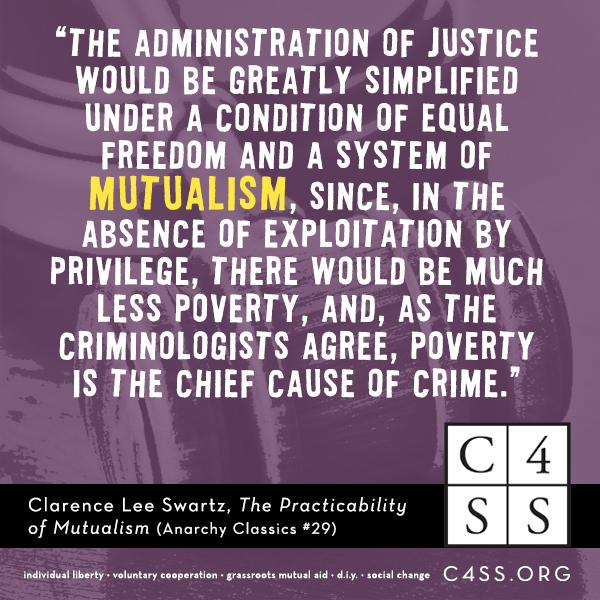Following their August 28th debate on left-libertarianism, Sheldon and Walter continued their exchange via a series of emails:
__________
Dear Sheldon,
Suppose it were proven that racism, prejudice, hatred for homosexuals, etc., was the best way to promote libertarianism. Let us stipulate that this is so, arguendo. Would you then say that libertarians should promote these stances?
If so, you would then be a right libertarian, not a left libertarian, correct?
Suppose it were proven that chess playing was the best way to promote libertarianism. Let us stipulate that this is so, arguendo. Would you then say that libertarians should promote these stances?
If so, don’t you see that we are no longer discussing what libertarianism IS, and are now talking about how best to promote it, an entirely different matter?
If I read Jeff Tucker correctly, he would consider me a brutal libertarian since I think that libertarianism, qua libertarianism, simply has NO position whatsoever on racism, prejudice, hatred for homosexuals, etc. Do you agree with him on this?
Best regards,
Walter
__________
Walter,
I’m puzzled by your hypothetical because it assumes that I put the promotion of libertarianism or liberty — divorced from all other considerations — at the summit of my concerns. I do not, and I never said I did. That would be an odd position for a thick libertarian to take. (It’s closer to thin libertarianism.) So no: I could not engage in vices, such as racism, for the sake of promoting libertarianism or liberty (as if that would work).
I did say that since I care about liberty, I care how it is promoted and therefore about grounding it as solidly as possible. (Which leads to the thick position that the grounds can imply commitments to other values.) But that is different from saying that I’d do anything — anything — to promote liberty. Since I root liberty in a conception of virtue, I certainly would and could not use vicious methods to promote it.
When Jeff uses the term “brutalism,” he’s referring, as he made plain, to a school of architecture that eschewed anything not deemed absolutely essential to the structure. It has nothing to do with brutality. Things have essences (epistemologically speaking), but that does not mean that things are nothing but their essences. A person is more than his rational faculty. So with libertarianism. It implies more than nonaggression in that its grounds imply other obligations. But — and this is what you overlook — some obligations are enforceable (nonaggression) and some are not (e.g, keeping naked promises; being respectful). There’s no theory of what you call positive rights here.
Regards to you and your bcc list,
Sheldon
__________
Thanks for your response.
In this article of yours:
Richman, Sheldon. 2014A. “TGIF: In Praise of ‘Thick’ Libertarianism.” April 4; [LINK]
You say this: “To put it more concretely, if a libertarian observed a growing propensity to embrace (nonviolent) racism, that person, qua libertarian, ought to be concerned. Why? Because that attitude and resulting conduct can be expected to eat away at the values conducive to libertarianism. It’s the same sort of reason that a libertarian would be concerned by, say, a growing acceptance of Keynesian ideas, even though merely holding and advocating those ideas does not require the use of force.”
So, now, I ask you suppose this were not true. Nonviolent racism (I suppose this means thinking that blacks are better track athletes than whites, but have lower IQs) will NOT “eat away at the values conducive to libertarianism” by stipulation. And yet you’re still back at the same old lemonade stand, maintaining you would not do this. I simply don’t understand.
And, what about chess. Surely, you would not consider this a “vice.” Would you say, under these stipulated conditions, that libertarians ought to be “concerned” with people who refuse to play chess?
I never said that you put the “promotion of libertarianism or liberty … at the summit of (your) concerns.” Rather, my disappointment with you, well, your position, is that you conflate the promotion of liberty with how liberty should be defined. I define it, simply, as the non aggression principle coupled with private property rights based on homesteading. If I understand you correctly, you agree with this (unlike those bleeding heart “libertarians”) but then add on all sorts of side order conditions: pro-feminism, anti-discrimination, opposition to hierarchies, etc. These may or may not help promote liberty. That is an empirical issue, as far as I’m concerned (my conclusion is that it helps with some people, hurts with others). But I’m talking libertarian PRINCIPLE and you are conflating this with the promotion of liberty.
For me, both left and right libertarianism are problematic. There is only plain old libertarianism, as defined above. (This is one of the reasons I am known far and wide as Walter Moderate Block). Of course, we libertarians have other interests. Some like chess, some like checkers. Should we then have chess libertarians and checker libertarians? Some of us like baseball, others football. Should we then have baseball libertarians and football libertarians? This would be silly. Just as silly as left and right libertarianism. Yes, Murray Rothbard wrote, sometimes, as a left libertarian, other times as a right libertarian. He did so when there were very few of us, in an attempt to gain converts for plain old libertarianism. And there is nothing wrong with that. For example, when trying to convert lefties, emphasize the libertarian view on drug and prostitution legalization, and our view on victimless crimes. When trying to convince righties of the merits of libertarianism, focus on our views on taxes, regulations, minimum wages, free enterprise, etc. I don’t deny that this left-right business arose in France a while ago. When you mentioned this in our debate, I didn’t dispute your historical facts. But, they are irrelevant to the PRINCIPLE of libertarianism.
Incidentally, I may have mislead you by mentioning, only, bcc. I should have said I’ve been blogging this: Block, Walter E. 2015. “Another Question to Sheldon Richman.” August 31; [LINK] If this creates any disquiet for you, I apologize. I only meant to say I would be sharing this conversation with others. Since we had had a public debate on this, I had a senior moment in not being more clear.
Best regards,
Walter
__________
[Sheldon:] Share away!
__________
Dear Sheldon:
Great. I didn’t think you’d mind.
Best regards,
Walter
__________
Dear Walter,
Show me where I conflate the promotion of liberty with the definition of liberty.
No matter how many hypotheticals you concoct, my point stands. Libertarians qua libertarians are justified in being concerned — I choose this word carefully — about anything that would tend to erode the values underpinning libertarianism. I’m amazed that’s controversial.
__________
Dear Sheldon:
You ask where I think you “conflate the promotion of liberty with the definition of liberty.” I think you do so many, many times in your writings. Let me just give you one example of this. This quote comes from here:
Richman, Sheldon. 2014C. “TGIF: Libertarianism Rightly Conceived.” May 2; [LINK]
In this you state: “The proposition on the table is that the most robust case for the libertarian philosophy … entails commitments not only to the Nonaggression Principle … but also to other values that don’t directly relate to aggression (for example, opposition to even non-rights-violating forms of racism).
I interpret “entails” and “commitments” as speaking to the very essence of libertarianism. I interpret you as saying here, that part of the DEFINITION of libertarianism is, indeed, the NAP. But that another part of it is opposition to “non-rights-violating forms of racism.” If this is not a conflation of what libertarianism IS, with the best way, in your opinion, of promoting it, then nothing is.
On another matter. If you think that Jeff Tucker’s essay on “brutalism” mainly concerns architecture, … I don’t know what to say. I’ll be polite: we have very different readings of this article. I see this writing of his as supportive of your thick libertarian views. And, just as problematic.
Sheldon, I no longer wish to carry on this debate as we have been doing, verbally, and via blog. Instead, I propose that we conduct it via the scholarly journal literature. (Hey, I’m almost at 500 articles, and I need all the help I can get.) So, please consider publishing material on this topic in that venue. As it happens, I have written two scholarly articles on this:
Montgomery, Stephen and Walter E. Block. Forthcoming. Review of Social and Economic Issues (RSEI).”Animal torture and thick libertarianism.”
Block, Walter E. Unpublished. “Thin and thick libertarianism”
Both of which I attach. You may want to consider using these as targets. One of my next books will be on this, and I plan to include your writings on this topic as targets.
Best regards,
Walter
__________
You misread me. Promotion means presenting a case. First, obviously, you need a case to present. That was my concern. Then I said the case entails (not necessarily logically) other commitments. I did not say the Nonaggression Obligation does.
I don’t plan to write this up formally. Lots of good stuff is already on the record.









